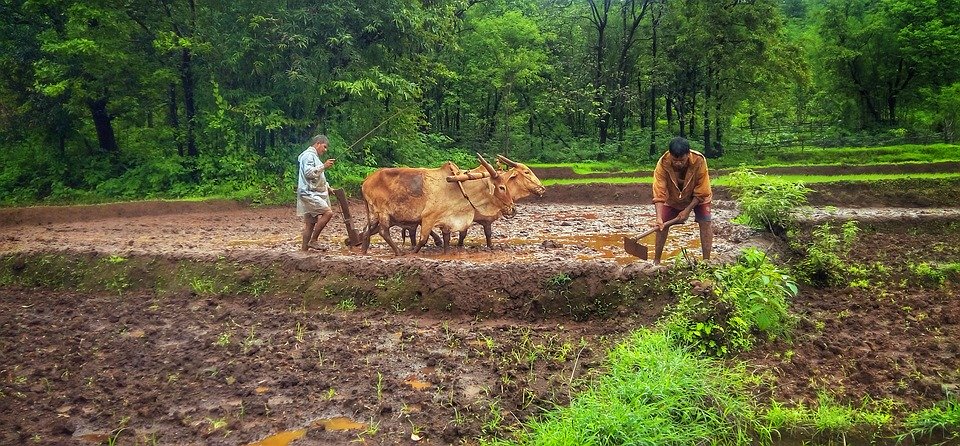Farmers can heave a sigh of relief. The central government has excluded farming-related works, machinery, fertilizers and fertilizer-seed shops from the 21-day lockdown. This means the farmers will be able to go to their fields freely, plough with tractors, harvest crops with combing machines and source seeds and DAP-urea from nearby towns.
The farmers will also be able to take their crops to the mandi. So, now the lockdown will not affect agricultural work. However, farmers have been urged to maintain proper distancing and observe coronavirus guidelines at all times.
Farmers were in a great distress following the lockdown. The police and the administration were ordered to strictly implement the lockdown, making it difficult for farmers to access markets and even fields across the country.
The Ministry of Home Affairs made several additional exemptions to the guidelines for the lockdown issued on March 24, following demands from farmers and farmers’ organisations because the months of March and April are crucial for farming activity. These are the harvesting months for many crops, including wheat. Also, many vegetable crops (like cucumber, lauki, tori, pumpkin), fruit crops (melon, watermelon) stand in the fields and need pesticides and fertilisers.
In the new order issued on March 27, 2020, the ministry said:
1.Farmers should do agricultural work without interruption. Workers will not have difficulty in working.
2.Crop-cutting machines (combine-reaper), etc, will be able to move from one state to another.
3. People involved in harvesting crops and harvesting at minimum support price at government level will be exempted from the lockdown.
4.All government mandis, agricultural produce market committees (APMC) or mandis that have been recognised by state governments are also exempt
5.Manure-seeds and chemical pesticide shops can function.
6.Farm machinery, custom hiring centres (for which the government has paid money and given grants through FPOs, etc), can also function
Before the Centre’s order, several states had already started taking pre-emptive steps. The Uttar Pradesh, Madhya Pradesh, Rajasthan, Maharashtra, Bihar and Haryana government, among others, instructed district administrations to facilitate crop harvesting and transportation of agri-produce to mandisand to ensure farmers didn’t face difficulty in procuring fertilisers, seeds, pesticides and ration. The governments also assured farmers they will not face any difficulty in farming-related activities.
In Uttar Pradesh, additional chief secretary Avnish Awasthi issued an order on March 26 stating that farmers, agricultural operations and critical agricultural machinery should not face any difficulty in operation. The order issued to the divisional commissioners and police officers said:
1.Combine harvesters used in rabi crop harvesting shall work, workers in agriculture shall also be able to work.
2.Fertilizers, wholesale and retail outlets of agricultural chemicals (pesticides) shall continue to operate as before. Fertilizer supply shall continue by railway racks. Labourers engaged in these activities are also permitted to commute.
3.Fertilizer factories, besides seed development plants, shall continue to operate; workers engaged in them shall be exempted.
The district magistrates at several places in Uttar Pradesh have appealed to the farmers to do agricultural work by maintaining social distancing (at least one metre from each other), not to work together in the fields and also to wash hands often.
Maharashtra said fertilizer, seed shops will remain open. Gaon Connectionhas seen orders of the collectors of several districts, including Pune and Latur, permitting farm and farm-related activities.
The government of Rajasthan, in its order issued on March 23, discontinued procurement of wheat at minimum support price (MSP) with immediate effect to prevent the spread of COVID 19. But, it said, harvesting of the crop will continue.
The Ashok Gehlot government’s order said harvesting can continue with some precautionary measures. It said:
1.Try to harvest more with machines. In the meantime, people working in fields must stay at a distance of five metres from each other and they should wash hands often.
2.Farmers or labourers working in the fields must keep their own water separately and eat in separate food utensils.
3. Persons having cough, cold or fever must be kept away from agricultural work.
As the governments try to ease their problems, farmers too have some responsibilities:
1.Whether village or farm, maintain social distancing (a minimum distance of one metre).
2.Don’t put more labourers together in the fields.
3.Do not drink water from a single bottle.
4.Keep buckets and soaps in the fields and keep washing hands.
5.Harvest the crop and dry it well, do not be in a hurry to sell, you may not get a good price
6.Keep the phone numbers of district agriculture deputy director, DM & SP of your districts handy. But exercise discretion in seeking their help.
7.And the most essential thing is to take care of your health.


















